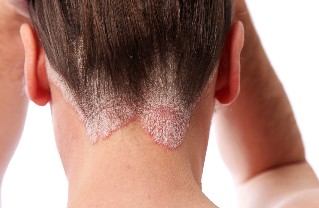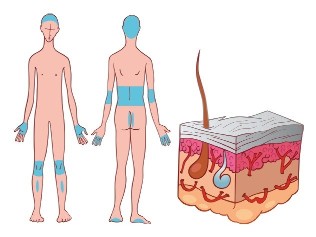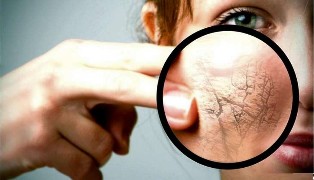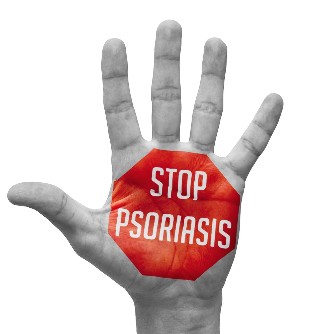
What is psoriasis
Psoriasis (flake ringworm) is a non-communicable chronic disease of the skin, which manifests itself in the form of a peeling, and rashes on the skin. Is characterized by a wavy current, with periods of remission (improvement), and periods of exacerbations. The disease can develop at any age, but most often psoriasis affects people of young age.
The intensity of psoriasis may vary considerably in its different stages. The disease can affect minor areas of the skin or cover the entire body. Often, the disease progresses, patients notice that with time (in a period of exacerbation) psoriasis affects a large area of skin. Outside of the skin, also provide psoriasis of the nails, which can be isolated from the form.
Psoriasis – the causes of the disease
The reason for the appearance of psoriasis is unknown, but cause the disease may be immunological changes in the body (autoimmune attack), neurological disorders, disorders of the metabolism. Contribute to the emergence of a psoriasis heredity, decreased immunity after the illness, the stress.
To this day, among the reasons and factors of development of psoriasis secrete the following:
- A hereditary predisposition (genetic theory of the evolution of psoriasis). The likelihood of developing psoriasis above, if the person is next-of-kin are also suffering from this disease. Perhaps, certain groups of genes are responsible for the implementation of the psoriasis.
- The neuro-psychic overvoltage (neurogenic theory of the evolution of psoriasis). It is known that psoriasis can be caused by strong emotional shocks. The stress related to serious factors of development of this disease. In people with psoriasis, stress can cause a worsening of the disease.
- The hormonal disorders. The changes in the functioning of the endocrine glands can become amorage in the development of psoriasis.
- A disorder of metabolism (metabolizable theory of the evolution of psoriasis). With problems of metabolism, of certain vitamins and trace elements (in particular, silicon), and may be, contribute to the onset of psoriatic plaques.
- Parasites. Considered to be a theory of the evolution of psoriasis, according to which the disease is caused by certain intestinal parasites. Many studies show that people with psoriasis, many in the media different parasitic infections. As the experts say, a particular role in the development of the disease can play a roundworm, giardia, wave tsepen, and other. It is considered that the toxic products that secrete these parasites are powerful allergens, which is the cause of an imbalance in the functioning of the immune system.
- The viral infections.
And although the causes of the evolution of psoriasis is not up to the end clarified, to this day, the medicine is known the mechanism of occurrence of this pathology. On the basis of the appearance of the psoriasis rash is the violation of the immune system. The immune cells become aggressive against their own skin cells, which leads to the appearance of psoriatic plaques.
Psoriasis – symptoms
Psoriasis manifests scaly patches, plaques red itchy strongly. The spots most often located on the scalp, elbow joints, knees, in the places of the skin fold. With time, the surface scales are easy to remove, in their place, are becoming increasingly dense and the scales are located in depth. With the progression of psoriasis observed phenomenon that we call Kebnera: the appearance of psoriatic plaques in places of scratches or wounds of the skin.
Here are the symptoms specific to different types of psoriasis:
- Psoriasis in the form of plates looks like raised above the surface of the healthy skin areas of red, inflamed, dry, thick, very warm to the touch of the skin, covered with silvery-white scales (psoriatic plaque). The skin on these areas prone to detachment. On the site of the skin that is peeled off, remain red foci, which are easily damaged and bleed. Psoriatic blister normally fuse together, the increase in the size and forming the plate of the plate ("the paraffin of the lake"). In the psoriasis flexural surfaces peeling expressed poorly. This raises red spots which are located in the skin folds (groin, the region of the vulva, the inner thighs, the folds of the belly, the armpits).
- Guttate psoriasis is characterized by a large number of dry food, small, red or purple defeats, raised above the surface of the skin, the shape resembling a teardrop or circle. These elements affect large areas of the skin. Guttate psoriasis often develops after a streptococcal infection (e.g., pharyngitis or tonsillitis).
- Are the pustular psoriasis looks like raised above the modified surface of the skin of the bubbles filled with transparent content. The pustules are surrounded by red, edematous skin that comes off easily. Psoriasis of the nails is characterized by a change in the color of the nail, the nail bed, the appearance of points, spots, of the cross-striations of the nail, thickening of the skin around the nail, thickening, and the whole of the nail, a complete loss of the nail.
- Psoriatic arthritis is accompanied by a painful process in the joints and connective tissues. Psoriatic arthritis most often affects the small joints of the phalanges, distal fingers, toes, causing dactylitis. Psoriatic erythroderma is common manifesto of the peeling and inflammation, detachment of the skin on a large surface of the body, swelling, skin sensitivity, intense skin itching.
Other symptoms of psoriasis include:
- rare material on the skin;
- the appearance of erosions and dimples on the nails;
- itching;
- possible joint pain and swelling.

The classification of psoriasis
There are different types of psoriasis:
- vulgar (or common) psoriasis;
- pericardial psoriasis;
- arthropathic psoriasis;
- psoriatic erythroderma;
- psoriasis of palms of hands and soles of the feet;
- are the pustular psoriasis.
Psoriasis takes place in three stages:
- Progressive stage of psoriasis. This is the first stage of the disease, characterized by a worsening, which has seen an increase in the number of new lesions.
- Fixed the stage of psoriasis. This period is characterized by the existing security model of the disease. Skin rashes and other symptoms of psoriasis is neither more nor less.
- The phase of psoriasis, which is in decline. This is the final stage of the disease, during which the ruptions are absent.
In terms of the prevalence of the disease of psoriasis is:
- limited – strikes to small areas of the body;
- joint – strike large areas of the body;
- pervasive – affects nearly all the body.
Depending on the season, when the disease gets worse, the psoriasis is:
- winter – exacerbation of psoriasis usually occurs during the the cold season;
- years – exacerbation of psoriasis occurs during the summer period;
- undefined – when the periods of exacerbation of psoriasis is not related to a season of the year.
The diagnosis of psoriasis
Diagnose the disease dermatologist on the basis of typical clinical. To refine the diagnosis apply a skin biopsy.
The action of the patient
You can take a sun bath for 15 minutes every day. It is advisable to refrain from consuming alcohol, avoid stress, watch your weight, a healthy lifestyle, take good care of the skin.

The treatment of psoriasis
For the treatment of psoriasis apply emollients, medications that restore the stratum corneum, local preparations (ointments, lotions, creams) along with the content of glucocorticoids (hydrocortisone, prednisolone, dexamethasone), drugs with the content of pyrithione zinc, ointment with the contents of the analogues of vitamin D3, tar, Naftalan, hydroxyestrone. In the severe forms of psoriasis, the inefficiency of the exterior of the therapy, a defeat of more than 20% of the surface of the skin prescribed the system of the pharmacotherapy, which includes cytostatics (methotrexate), synthetic retinoids (retinol acetate, retinol palmitate, tretinoin), glucocorticoids, vitamins (aevit, etc.).
A special role in the treatment of psoriasis needs to be given to some of the biologically active substance, among which should be noted:
- Silicon. In recent years, doctors increasingly on the role of silicon in the development of psoriasis. One of the components of treatment for psoriasis are medications and vitamin and mineral complexes containing silicon. On the one hand the silicon improves the condition of the skin, and the other plays the role of the agent of sorption, which aspires to antigens that play a role in the development of psoriasis.
- Of vitamin D. As we know, one of the important minerals necessary for the success of the fight against psoriasis, is the calcium. However, for the normal absorption of calcium requires vitamin D. the Best preparations of vitamin D include after the active phase of psoriasis in the fixed.
- Fish oil and omega-3 acids. To resolve the inflammatory process in the case of psoriasis, you need to the intake of polyunsaturated fatty acids omega-3 fatty acids, which in a large number of content in fish oil.
- Lecithin. This substance is necessary for a rapid recovery of epithelial cells which die in the psoriasis. Drugs with lecithin will allow you to quickly cope with an inflammatory process and restore the integrity of the skin.
Non-drug therapy is the photochemotherapy: the irradiation with ultraviolet light of wavelength 320-400 NM on the bottom of the receipt of photosensitizers (PUVA-therapy). Also use cryotherapy, plasmapheresis.
The patient should follow a special diet. The diet in psoriasis should be balanced. The patient should be eliminate from your diet refined products, spicy dishes and sweets. It is necessary to carefully monitor their health and seek to prevent colds, because any violation of immunity might lead to the development of the disease.
Complications
Among the possible complications of the arthritis, the depression caused by low self-esteem.

The prevention of psoriasis
It is impossible to prevent the disease, but there are techniques that can reduce the manifestations of psoriasis and reduce the number of exacerbations. Need to take care of the skin from over-drying, avoid prolonged exposure to the sun, and avoid injury to the skin. It is important to avoid stressful situations, infections, medication, the strengthening of the manifestation of psoriasis (for example, β-blockers, lithium), stopping smoking, limiting alcohol consumption. And don't forget that the treatment of psoriasis need to entrust to professionals. The treatment of psoriasis at home and all sorts of cure of this disease are not valid.
























